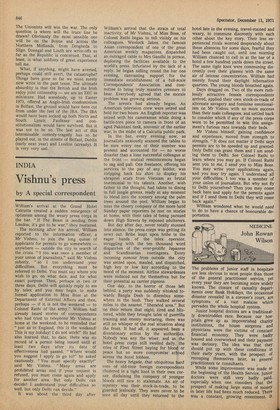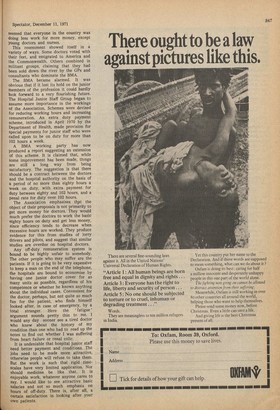MEDICINE
John Rowan Wilson
The problems of junior staff in hospitals are less obvious to most people than those of the general practitioner service, yet every year they are becoming more widely known. The closure of casualty departments over Bank Holidays, the occasional disaster revealed in a coroner's court, are symptoms of a vast malaise which pervades the whole hospital system.
Junior hospital doctors are a traditionally downtrodden race. Because our hospitals grew up as impoverished charitY institutions, the house surgeons and physicians were the victims of constant financial economy. They were badlY housed and overworked and their payment was derisory. The idea was that they should put up with these conditions in their early years, with the prospect Of recouping themselves later, as general practitioners or consultants.
While some improvement was made at the beginning of the Health Service, junior doctors were still very badly paid, especially when one considers that the prospect of making large sums of moneY in later life had been much reduced. There was a constant, growing resentment. It
seemed that everyone in the country was doing less work for more money, except Young doctors and nurses.
This resentment showed itself in a variety of ways. Some doctors voted with their feet, and emigrated to America and the Commonwealth. Others combined in militant groups, claiming that they had been sold down the river by the GPs and consultants who dominate the BMA.
The BMA became alarmed. It was obvious that if it lost its hold on the junior members of the profession it could hardly
look forward to a very flourishing future. The Hospital Junior Staff Group began to
assume more importance in the workings of the Association. Schemes were devised for reducing working hours and increasing remuneration. An extra duty payment scheme, introduced in April 1970 by the Department of Health, made provision for special payments for junior staff who were called upon to be on duty for more than 102 hours a week.
A BMA working party has now produced a report suggesting an extension of this scheme. It is claimed that, while some improvement has been made, things are still a long way from being satisfactory. The suggestion is that there should be a contract between the doctors and the hospital authority on the basis of a period of no more than eighty hours a week on duty, with extra payment for duty between eighty and 102 hours, and a penal rate for duty over 102 hours.
The Association emphasises that the object of their proposals is not primarily to get more money for doctors. They would much prefer the doctors to work the basic eighty hours on duty and get less money, since efficiency tends to decrease when excessive hours are worked. They produce evidence for this from studies of lorry drivers and pilots, and suggest that similar studies are overdue on hospital doctors.
Any off-duty remuneration system is bound to be highly unfair to somebody.
The other people who may suffer are the patients. If it is going to be very expensive to keep a man on the end of the telephone, the hospitals are bound to economise by having one junior doctor cover for as many units as possible, regardless of his competence or whether he knows anything about the individual cases. Convenient for the doctor, perhaps, but not quite so much fun for the patient, who finds himself looked after, in case of emergency, •by a total stranger. Here the ' fatigue ' argument sounds pretty thin to me. I would any day sooner see a tired doctor who knew about the history of my condition than one who had to read up the notes to find out whether I was suffering from heart failure or renal colic.
It is undeniable that hospital junior staff need better payment and conditions. The jobs need to be made more attractive, otherwise people will refuse to take them.
But the work is such that rigid timescales have very limited application. Nor
should medicine be like that. It is enjoyable work, whatever anyone cares to say. I would like to see attractive basic salaries and not so much emphasis on hours of off-duty. There is, after all, a certain satisfaction in looking after your own patients.











































 Previous page
Previous page